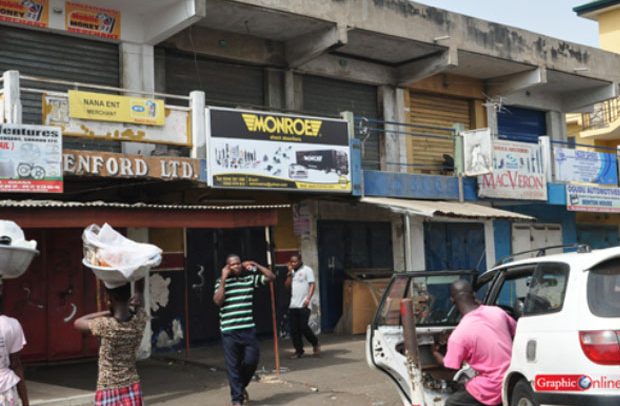SHOP OWNERS in the national capital, Accra, yesterday closed their businesses to protest against a weakened currency and the high cost of doing business in the country recently.
The shop owners said the weaker cedi, now GH¢13 to $1, has raised the cost of imports, while the high inflation rate has eroded their capital, thereby exacerbating their plight.
The strike, which is expected to be in place until Monday, October 24, 2022, is the latest and second demonstration against the rising cost of living in the country by traders.
National President of the Ghana Union of Traders Association (GUTA), Dr. Joseph Obeng, explained a day before the strike that they shut their businesses to urge the government to address their grievances.
“It is obvious that we cannot contain these challenges any longer as it is becoming increasingly challenging,” he stated on Tuesday.
The cedi dropped to a record low against the US dollar last month, before the central bank intervened to strengthen it, but it is growing weaker again, and there are fears the traders’ strike, which began in the Ashanti Region, may cause a rise in the price of staple foods.
Before the strike, members of the Council of State met the leadership of GUTA and pleaded with the traders to rescind their decision to close down their shops, but they did not budge.
Yesterday, shops in business centres such as Opera Square, Rawlings Circle, and Okaishie were seen closed in line with the strike declared.
Dr. Obeng said, “We want to send a hint to the government to recognise that there is a sense of urgency in this situation,” and consequently declared that all shops in the Greater Accra Region be closed.
GUTA also wants the government to ascertain the factors that are leading to excessive demand for the dollar, and review investment laws to address capital flight.
“Government should adopt other alternative currencies like the Chinese Yuan to reduce the pressure on the dollar. There should be the immediate implementation of the road map set out to flush out all illegal foreigners in the retail trade sector,” Dr. Obeng added.
Table Top Operators
Even though most shops were closed, a significant number of traders, especially those operating on table tops, were at the Central Business District to ply their business.
Some of the traders argued that they did not believe in closing down their shops, but indicated that they were in support of the move to get the government to address the falling currency and the high cost of doing business.
A week before this strike, traders in Kumasi embarked on a similar action and demanded for a redress of their grievances of high cost of doing business and the cedi depreciation.
BY Ernest Kofi Adu


